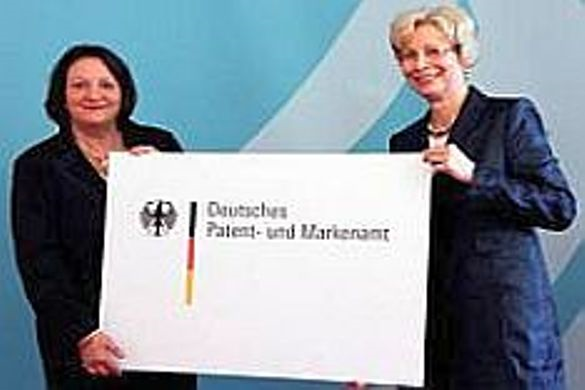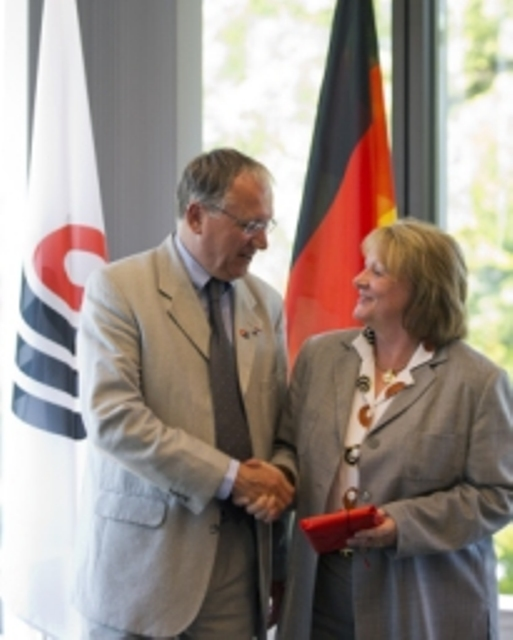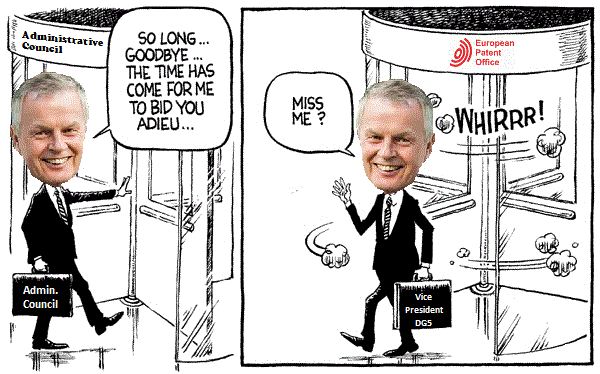

The German delegation: Christoph Ernst from the Ministry of Justice and Consumer Protection and his deputy Cornelia Rudloff-Schäffer, head of the German Trademark and Patent Office in Munich.
As is generally known, the EPO is headquartered in Germany with its main office in Munich and a sub-office in Berlin. It also has a main branch office at Rijswijk near The Hague in the Netherlands.
"One might have expected that the delegations representing the host states of the EPO would have been inclined to properly scrutinise the proposed restrictions of staff rights."However, all of these three host states voted in favour of Battistelli's "Strike Regulations".
In the case of the German delegation, this is not really surprising. At the time in question the delegation was headed by Christoph Ernst who was heavily under the sway of his mentor and reputed "handler", the EPO Vice-President Raimund Lutz. Ernst's deputy on the German delegation was Cornelia Rudloff-Schäffer, head of the German Trademark and Patent Office in Munich.
"Back in the pre-Brexit days of 2013, preparations for the EU's Unitary Patent project were in full swing."Rudloff-Schäffer is reputed to have had a more critical attitude towards Battistelli but due to her subordinate position she was unable to counteract Ernst who had the final say as head of delegation.
In addition to this, it should not be forgotten that both Ernst and Rudloff-Schäffer were ultimately under the authority of the German Justice Minister who, at the time in question, was Sabine Leutheusser-Schnarrenberger from the German liberal party, FDP.

Justice Minister Leutheusser-Schnarrenberger with Rudloff-Schäffer unveiling new DPMA logo in July 2010.
"According to well-informed inside sources at the EPO, Battistelli took advantage of the occasion to impress upon Leutheusser-Schnarrenberger that his planned "reforms" were of vital importance for ensuring that the EPO would be "fit" for the soon-to-be-implemented Unitary Patent."At that time the German political establishment was very gung-ho about the Unitary Patent project and the associated Unified Patent Court (UPC). This enthusiasm was due in no small part to the "capture" of the Federal Justice Ministry by zealous UPC lobbyists, led by Hogan Lovells consultant, Winfried Tilmann.

Battistelli cosying up to Leutheusser-Schnarrenberger in June 2013
"The Corsican despot's "charm offensive" towards the German Justice Minister seems to have worked because from that point on there was rarely a murmur of dissent from the German delegation to any proposals tabled by Team Battistelli."According to well-informed inside sources at the EPO, Battistelli took advantage of the occasion to impress upon Leutheusser-Schnarrenberger that his planned "reforms" were of vital importance for ensuring that the EPO would be "fit" for the soon-to-be-implemented Unitary Patent.
The Corsican despot's "charm offensive" towards the German Justice Minister seems to have worked because from that point on there was rarely a murmur of dissent from the German delegation to any proposals tabled by Team Battistelli.
With hindsight, it seems that the subservience of the German delegation was intensified by Ernst's own personal ambitions to succeed Lutz as the Vice-President of the EPO's International and Legal Affairs Directorate via the EPO's notorious revolving door.
EPO insiders have reported that Ernst always took great care not to cross swords with Battistelli during his time as head of the German delegation.

Ernst's loyalty and subservience to Battistelli were ultimately rewarded with a well-paid post-retirement sinecure as EPO Vice-President.
[PDF] in case it gets edited or removed.
What social reforms were necessary?
For example, the controversial reform of the right to strike. Customary law had developed in the EPO, and it had to be put on a proper statutory footing. Overall, the regulation is a step forward. One can always discuss the details, and that is what is being done.